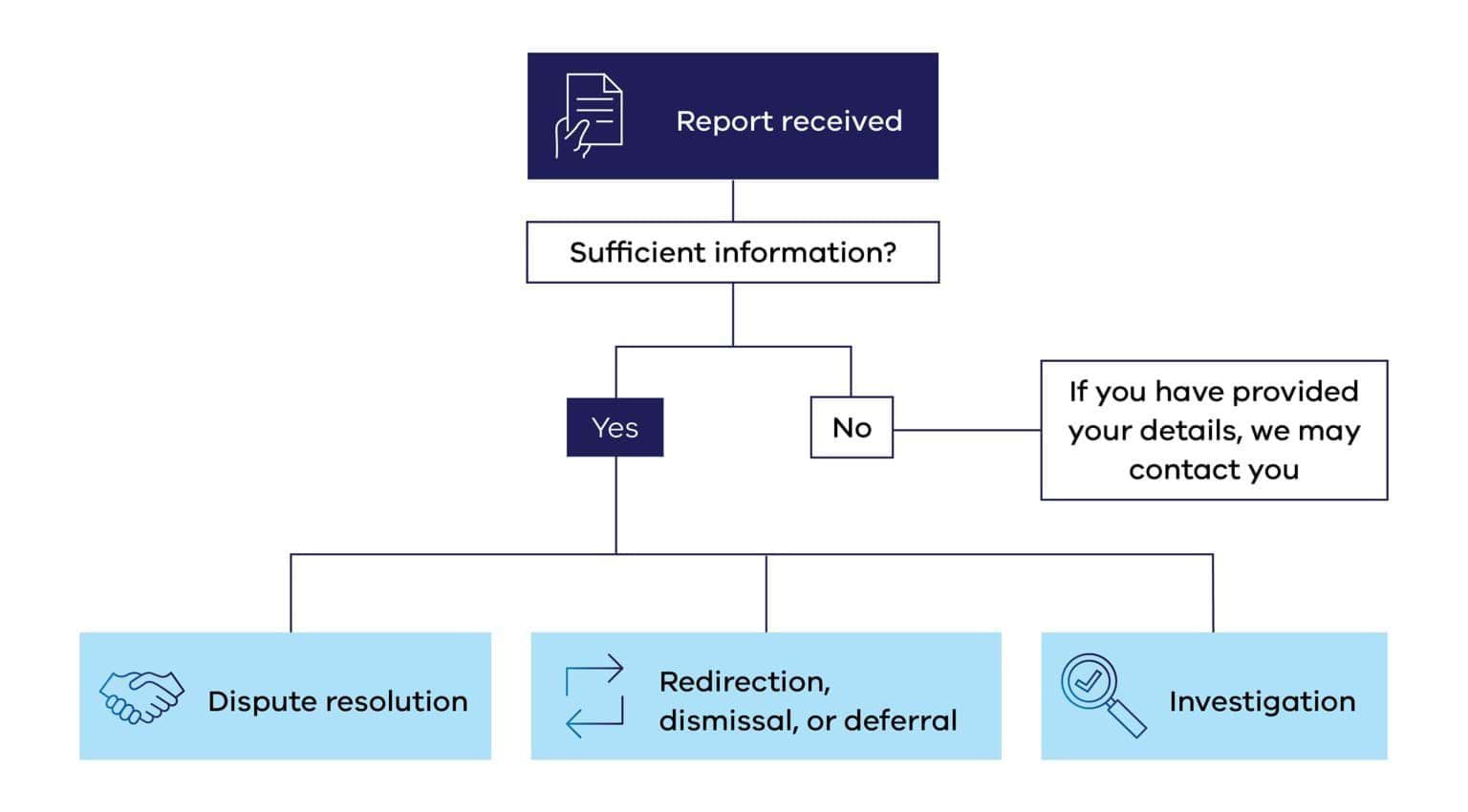The Victorian Parliamentary Workplace Standards and Integrity Commission (the Commission) is an independent and impartial body. This means we do not advocate for either the person making a report of misconduct or the individual the report is about.
When we receive a report of alleged parliamentary misconduct, we carefully assess the information provided to determine the appropriate course of action.
We aim to resolve matters swiftly and with minimal formality, if possible.
We will:
Conduct an initial assessment
We assess the report to ensure we have sufficient information.
If more information is needed, we may contact you (if you have provided your details).
We will contact every person who reports misconduct to acknowledge your submission and discuss next steps with you (if a method of contact is provided).
Decide on next steps
Based on our assessment, we might take the following steps to resolve your matter:
- undertake dispute resolution
- redirect, dismiss or defer consideration of the matter
- conduct an investigation.
These steps are described in more detail below.
Dispute resolution
We may use dispute resolution methods, such as mediation, to address allegations of parliamentary misconduct.
Dispute resolution involves the affected parties, including the person making the report and the individual the report is about. Everyone must agree on the process, format, and location.
Dispute resolution is not used for serious parliamentary misconduct.
If the Commission has determined that the matter has been resolved, the process concludes.
If the matter is unresolved, it may proceed to investigation, redirection or dismissal.
Redirection, dismissal and deferral
Mandatory redirection or dismissal
Under our legislation, reports of parliamentary misconduct are called 'referrals'.
Our legislation requires us to redirect or dismiss a referral if:
- the referral is not supported by sufficient evidence
- it falls outside the Commission’s functions
- it concerns conduct before 31 December 2024
- it involves personal, private or policy matters
- it relates to conduct protected by parliamentary privilege
- it relates to the views or opinions of a current or former member of parliament, minister or parliamentary secretary
- it relates to internal funding or decision-making of a political party.
Discretionary redirection or dismissal
We may redirect or dismiss a referral if:
- another agency is better suited to handle the matter
- the referral is deemed trivial, frivolous, vexatious, not credible or not in good faith
- it concerns matters that you experienced or found out about more than 12 months ago.
Who we can redirect matters to
We can redirect matters to:
- an integrity body such as the Victorian Ombudsman or the Independent Broad-based Anti-corruption Commission (IBAC)
- a law enforcement agency such as Victoria Police
- a prosecutorial body
- the Victorian Equal Opportunity and Human Rights Commission
- a coroner
- a privileges committee
- the presiding officer of a House of Parliament (the Speaker of the Legislative Assembly or the President of the Legislative Council)
- a person or body specified in Schedule 3 to the Ombudsman Act 1973 (Vic).
- a prescribed person or body.
- other agencies or people with the relevant public or official function.
Deferring a report
We can delay dealing with your report or 'referral' of alleged parliamentary misconduct if the issue you have raised is being investigated by another agency. We can only defer your complaint for a reasonable period.
We must let you know if we have decided to defer your referral.
Investigations
If the Commission decides to investigate, we will notify the person who made the report and the person subject to the report.
Investigation requests
During an investigation, we may:
- request information or documents
- ask someone to attend an interview.
Anyone who receives such a request must have a valid reason if they cannot comply.
Confidentiality notices
We can issue a confidentiality notice to prevent people sharing certain information about an investigation.
If you receive a confidentiality notice during an investigation, it will explain who you are allowed to speak to. An information sheet provided with the notice will outline your rights and responsibilities.
Procedural fairness
The Commission ensures procedural fairness by allowing individuals to respond to proposed findings and considering their input before finalising reports.
While we follow procedural fairness, we are not bound by the rules of evidence. This means:
- the person being investigated will have an opportunity to respond to proposed findings
- their response will be considered in our report, and it may be included alongside any findings (responses that are deemed defamatory, baseless or which contain confidential information will not be published).
Outcomes of investigations
If misconduct is found, the Commission can impose sanctions requiring a member of parliament, minister or parliamentary secretary to:
- issue a public or written apology (including an explanation to an affected person)
- participate in a mandatory training program
- participate in mediation with an affected person
- enter into a behaviour agreement with parliamentary leaders.
The Commission can also recommend further actions to parliament or the Premier for serious misconduct or, if a person has not complied with an investigation request without a reasonable excuse. These can include:
- withdrawing services or access to certain facilities
- discharge from a parliamentary committee (for members of parliament only)
- withdrawal of the person's commission or appointment as a minister or parliamentary secretary
- imposing a penalty under the Members of Parliament (Standards) Act 1978 (Vic).
We are required to monitor compliance with the sanctions we impose and report any non-compliance to parliament.
How long we take to deal with reports
We aim to handle reports promptly, and we are required to act as quickly and with as little formality as possible.
More time may be needed when managing complex matters. We will keep you informed about the status and stage of your matter.
Note
The information on our website constitutes the Commission’s guidelines in relation to the matters listed in section 82 of the Parliamentary Workplace Standards and Integrity Act 2024 (Vic).
Updated


